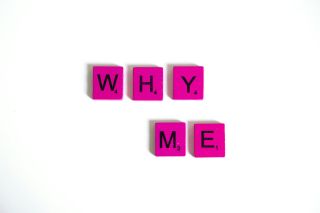Traumatic Brain Injury
Why Did Brain Injury Happen to Me?
For those with a brain injury, replacing bewilderment with understanding.
Posted June 26, 2024 Reviewed by Gary Drevitch

“Why did this happen?” These words rumble through the bewildering, shocking aftermath of a catastrophic brain injury. English is a funny language. The same words in the same order have two different meanings. This question probably made you hear whining, complaining, moaning about the questioner’s fate.
Or perhaps you heard the desperate seeking for understanding why.
“Why did this happen to me?” may sound self-pitying, with the reflexive thought of, “Why not? What makes you special?” Yet our ancestors built our society on the idea that individual hard work and obeying the law reap rewards, and so when disaster strikes instead, this question would arise.
Two thousand years ago, Jesus challenged the same reasoning behind a man’s paralysis: Was it his sin? Jesus clarifies:
“Neither this man nor his parents sinned,” said Jesus, “but this happened so that the works of God might be displayed in him.” (John 9:3)
The ancient Book of Job shows that Job did not cause his tragic situation, that complaining is normal, and that we should not judge it as a failing.
A health care professional once told of a client glad of their brain injury. “Well, goody for them,” I reacted. Why must rehab or mental health professionals require me to adopt the belief that I’m better off when it’s not true for me? Why does the mental health profession insist on us accepting and celebrating a catastrophic injury as a positive that lets us discover ourselves anew?
Perhaps it’s a slightly skewed response to an injured person’s natural need to understand. Instead of working with the injured to unearth answers, the non-injured shortcut processing what happened by insisting we look on the positive side.
Human beings both hate change and can’t help exploring. Exploring the reason behind the trauma naturally focuses on ourself specifically. The answer to “Why did this happen to me?” demands a seeking. Declaring that the cause was random leaves one feeling dissatisfied, like reading a mystery novel whose solution is magical instead of a realistic resolving of the clues.
I wrote in a previous post, “The personal connection with a higher power robustly predicted subjective and objective rehabilitation outcomes. This connection improved life satisfaction, reduced distress, and predicted better functional outcome—the same things that Dr. [Andrew] Newberg found in the research studies he reviewed in his Wondrium course The Spiritual Brain.”
Curiosity lurks behind every why, including discovering the scary reason behind a catastrophic injury. Researchers C. Hsee and B Rowan wrote in Psychology Science that "the research suggests that humans possess an inherent desire, independent of consequentialist considerations, to resolve uncertainty; when facing something uncertain and feeling curious, they will act to resolve the uncertainty even if they expect negative consequences.” Interviewed in a 2016 Scientific American article on this study, Hsee said, "Thinking about long-term consequences is key to mitigating the possible negative effects of curiosity."
This question “Why me?” isn’t so much about finding meaning, but about understanding how and why we’re in this inexplicable hell. Working out the answer to this question is like crawling out of a bewildering cacophonic kaleidoscope and entering rational terrain.
Faith creates an opportunity to explore this question within the context of knowing we won’t be alone with the long-term consequences.
We build a relationship when we connect personally with a higher power. Like any relationship, we talk and ask and think back and look forward. But since we usually perceive that higher power as having created us, given us our talents, and set us on a path that fits into their overall plan for the universe, we may also explore our youthful experiences and desires.
Talking about those experiences with a higher power helps us learn from mistakes we may have made or misperceptions we may have held that led to the injury; but the personal connection also leads us to dig deeper.
I studied abnormal psychology at the University of Toronto. While reading my textbook, I puzzled over how little it had on traumatic brain injury. Since the same textbook included the Phineas Gage story from a century earlier, I’d expected pages on brain injury instead of the one page I found — only two paragraphs of which were on concussion. I felt cheated and stupefied. How could the writers of the 1980 edition of Abnormal Psychology, Current Perspectives, have restricted this complex topic to one page? I wanted to know more, but life took me in a different direction. And although the question haunted me, I relegated it to the back of my mind, believing that maybe one day I’d learn more but probably not.
I did not expect that the road to answering my youthful quest would begin with my own catastrophic brain injury.
My journey from brain injury to precise diagnosis to effective treatments began with my diagnosing doctor telling me I should write a book on this hidden epidemic (I did) and ending with developing a website that includes much more information on concussion and brain injury than had existed on that one textbook page. My research and experience don’t provide a complete answer to my youthful quest, for we have so much more to learn about the brain and injuries to it.
But without suffering brain injury, that question would have continued to haunt me my whole life. It seems a little strange that a loving God would allow a four-car crash to happen that injured my brain in order to answer a question that had haunted me for almost 20 years; yet exploring my youth and thinking back on my desires resolved the question of why enough to quiet the internal maelstrom. Although I’m not pleased with the how, I left bewilderment through exploring “Why me?” And within that context, I could thus seek meaning in my current life and ponder where to put my precious energy now.
Copyright ©2024 Shireen Anne Jeejeebhoy
References
Hsee CK, Ruan B. The Pandora Effect: The Power and Peril of Curiosity. Psychol Sci. 2016 May;27(5):659-66. doi: 10.1177/0956797616631733. Epub 2016 Mar 21. PMID: 27000178.
Waldron-Perrine, B., Rapport, L.J., Hanks, R.A., Lumley, M., Meachen, S-J., & Hubbarth, P. (2011). Religion and spirituality in rehabilitation outcomes among individuals with traumatic brain injury. Rehabil Psychol. 2011 May;56(2):107-16. doi: 10.1037/a0023552.




